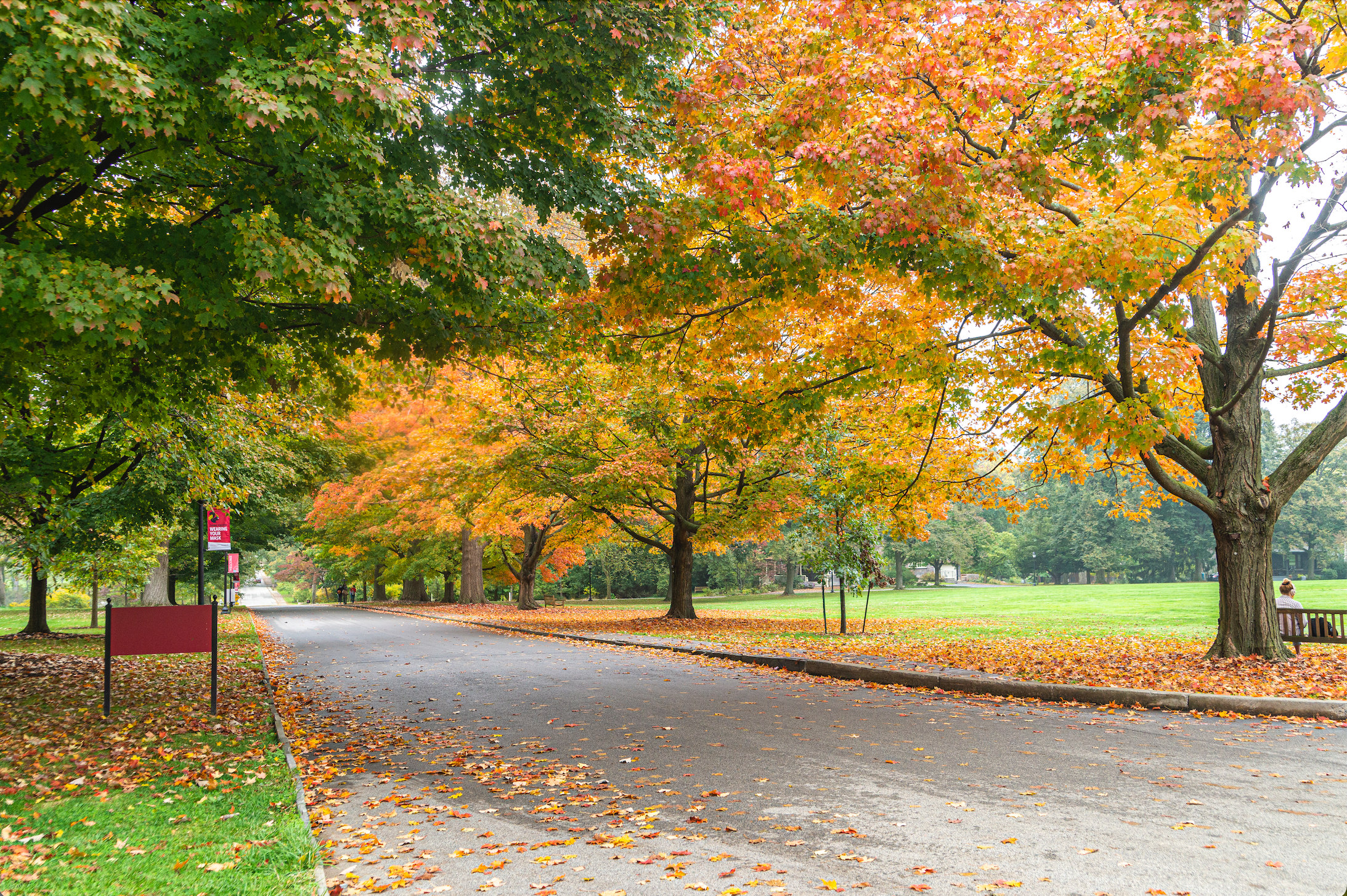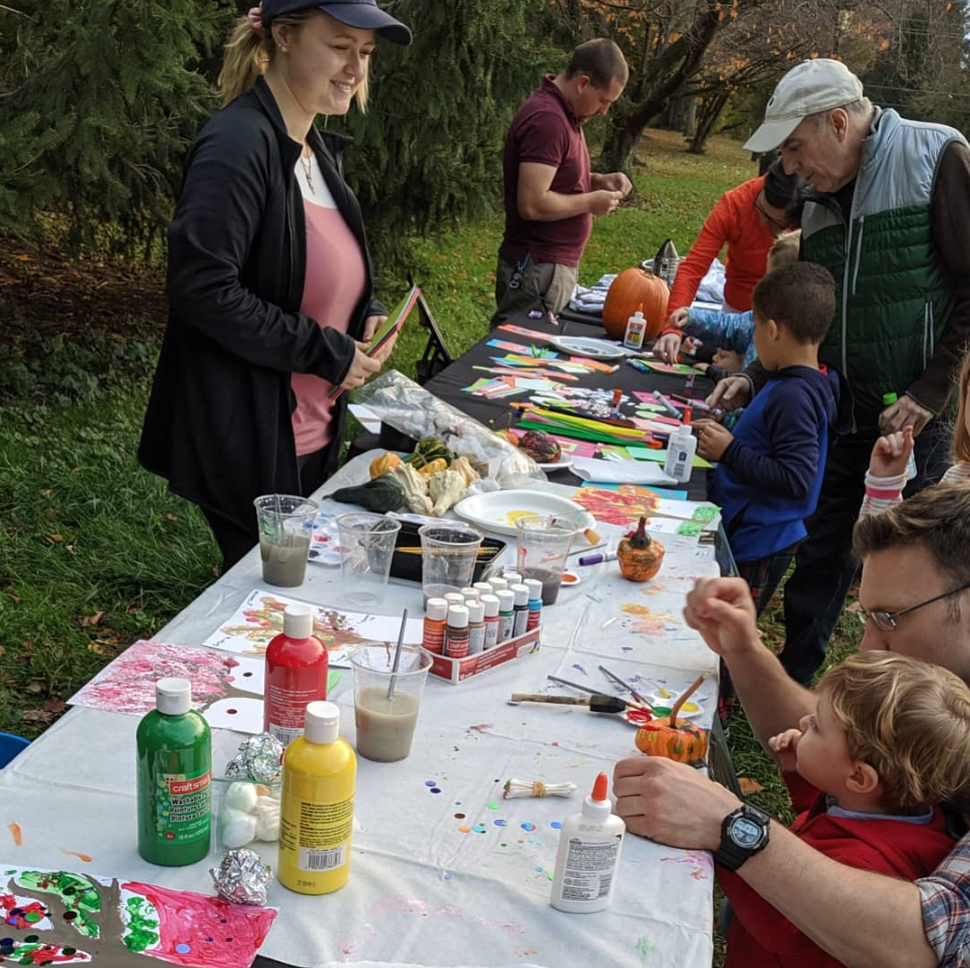Haverford College’s tree-lined College Lane. Photo credit: Patrick Montero
Trees have a calming effect. Photo credit: Jennie Kelly
Why Trees?
As we face a warming climate, trees are more vital than ever. The benefits of trees are numerous as they help clean our air, absorb carbon dioxide, cool our communities, filter water, and provide habitat to native organisms. Studies also show that walking among trees can improve a person’s mood, reduce stress, and lower blood pressure.
Philadelphia’s Campus Friendly School Arboretums
Is your campus tree-friendly? Do you have mature trees and a variety of deciduous and coniferous trees that could be part of your students’ education? Consider certifying your campus as an accredited arboretum (an area devoted to cultivating trees of a wide variety of species).
Hazy day at the Haverford College Arboretum. Photo credit: Jennie Kelly
Three Philadelphia-area schools have achieved arboretum-status: Abington Friends School, Swarthmore College, and Haverford College.
Abington Friends School is the first accredited secondary school certified by ArbNet, an international network for tree-focused professionals that sets industry standards for public arboreta.
Swarthmore College's campus features over 4,000 kinds of plant specimens in their 300-acre Scott Arboretum. You can virtually tour their various gardens in every season here.
And Haverford College, founded by Quakers in 1833, boasts the oldest planned collegiate landscape in America. Haverford’s entire 216-acre campus attained arboretum status in the 1970s.
Example of signage from Haverford’s tree tour
Haverford’s Tree Tour
Haverford’s leafy campus welcomes visitors to stroll its 2.2 mile nature trail. The trail offers a diverse collection of trees including: mature oaks and maples, flowering trees, and a natural woodland environment.
Haverford College’s Arboretum Program Coordinator, Jennie Kelly, helps oversee the school’s Arboretum. Jennie noted, “Haverford’s impressive diversity and richness of tree species has led to the College earning Level III Arboretum Accreditation from ArbNet.”
To make the campus experience more interactive, walkers can participate in the College’s tree tour. Some trees are labeled to identify the species’ common and Latin names. In an effort to be more sustainable, Haverford replaced its paper map of the tree tour with QR codes. Upon scanning the QR code with a cell phone, the user experiences a virtual tour including a map and information about each tree on the tour.
Arboretum 2021 Fall Festival Crafts
Engagement with the Community
One of the pillars of the Arboretum is to foster community between people in and outside of Haverford. “We see walkers, runners, families, all generations on this trail,” noted Jennie. “It’s a great way for people to connect not only with nature but with others in the community.”
The Arboretum offers a number of opportunities for locals to engage with trees. Some of these activities include lectures, educational programs, birding walks, terrarium workshops, seasonal tours of the grounds, field trips for local schools, an internship program, weekly volunteer days, and various fun events such as pumpkin carving. For more information, see this link.
Learning Tools
Trees can also be useful in the classroom. They can be teaching tools to educate students about the changing of the seasons, photosynthesis, carbon sequestration, species identification, and allow them to put their new skills into practice in nature. Haverford’s environmental studies classes have had success with this type of hands-on learning in the Arboretum. Students are able to go outside and are excited about plants. For more curricular connections, MyTree is an excellent educational resource for mapping and assessing individual trees on campus and at home.
Investing in the Future by Planting Trees Now
Planting, tending, and caring for trees is vital for the environment, our health, our future, and our students.
Jennie’s advice to other organizations who are looking to reach arboretum status: “Do your research, look at your resources, and plan for the future.” She continued, “Trees are a long term investment. Take into account how the climate will change and how the trees will grow 50 to 100 years into the future.”
To explore whether your campus is arboretum friendly, see ArbNet to find out the next steps for achieving arboretum accreditation. If your campus is not the most arboretum friendly, consider just planting more trees!
Article by Jessica Korgen, Sustainability Intern at Boyer Sudduth Environmental Consultants. Jess is a student at Haverford College with a major in Environmental Studies.
Article printed in PAISBOA’s Friday Flyer, Vol XI, No. 14 - October 7, 2022.







